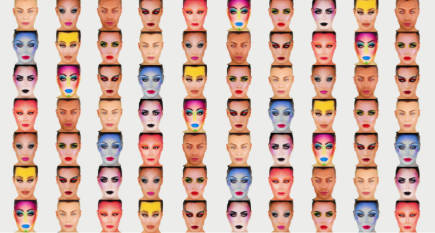

Along with Kellgren-Fozard’s contents mainly focusing on raising awareness and educating people of her disabilities, other YouTubers are also using the platform to educate their viewers and to express their personal interests. Ewha Voice interviewed two talented YouTubers: Bread Park, a 26-year-old Korean blind YouTuber who reviews airsoft guns, and Joseph Harwood, a creative director and a professional makeup artist, to dive into the issue of how their work is helping to break down physical and social barriers.
A weapon against discrimination – Bread Park
Bread Park’s journey to becoming a YouTube content creator has not been easy. Although he had normal vision until just two years ago, he suddenly lost his sight through illness and now can only perceive the presence of light. Feeling at a loss, he wanted to do something to escape from his boredom. At first, he uploaded mukbang videos where he films himself eating. Then, as he has a great interest in collecting airsoft guns, which are replica weapons often designed to shoot plastic ball projectiles (BBs), he also started uploading video reviews of them. He now has more than 10,000 subscribers and has earned the label of being a “military YouTuber,” given that his most popular videos are weapon-related.
“Being disabled isn’t something you can ‘overcome,’ in fact, you can never overcome disability,” Park said. “It’s something that you have to accept and try to find a way to keep on going. So, for me, making videos on YouTube and expressing my opinions on different kinds of airsoft guns was what I wanted to do.”
Park not only reviews guns, but also talks candidly about being blind and how he runs his channel “Bread Park” alone. He educates people on what being blind really means, replying to his viewers’ comments and questions by himself. Given that there were frequent questions from viewers on how he films and edits videos, he filmed the whole process to help them understand. He expressed that this process would be impossible without the audio output system of his laptop and mobile phone, which describes every detail of motions and words. For example, when Park is filming, the camera system tells him whether he is in the center of the screen or not, as well as how many faces it recognizes. For editing, the system automatically generates audio descriptions when the cursor is on a toolbar or on certain words. Although it takes several days for him to prepare and upload a single video, Park does not think of it as a big problem and does all the work by himself.
However, the greatest challenge that Park faces is the rude comments posted on some of his videos, with viewers saying that they don’t believe that he is blind or making fun of his disability. Such hate comments prompted Park to create a short series of educational videos to explain the facts of his disability and encourage more people to take interest in such issues.
“As most people aren’t exposed to information about disability and still have many misconceptions about it, I do think that YouTube has provided a great platform for disabled people to talk about their stories and help non-disabled people to better understand us,” Park said. “But the problem is that not many people are watching such contents, so I think what we need to do first is to gain a larger audience.”
Currently, Park is carrying out both his day job at a company and his YouTube career. Park now aims to reach 100,000 subscribers and keep up his passion to motivate more disabled people to participate and help to create a more diverse community.
Changing perspectives on drag & transgender – Joseph Harwood
Professional makeup artist Joseph Harwood is well known for his androgynous and stunning transformational makeup. The 27-year-old Brit is the first ever non-binary person - someone whose gender identity isn’t exclusively male or female - to win Simon Cowell’s The You Generation online talent contest, and the most viewed platform of any non-binary person in Europe. Harwood started his YouTube channel in 2013, to which he uploads makeup tutorials on various looks such as pop art comic book characters, mermaids and zombies. He now has more than 151,600 subscribers.
“When I started posting online it was actually on MySpace where there was a filter that you could use to search for other LGBT people,” Harwood said. “So, it all began with a sort of desperation to find people like myself to talk to, as I grew up in a small village outside of Brighton. YouTube was a really empty platform that was full of absolute extremes at that time. I used to use two lamps and a digital camera that wouldn’t stay in focus. It was a wild trip before I made any money.”
After forging his career in makeup in 2012, Harwood worked with the Princes Trust, a charity that provides practical and financial support to youths, and learned how to draft a business plan at just 17 years old. His hard work paid off when he got the chance to assist MAC creative director Terry Barber at a masterclass, and now makes beauty products that are retailed across the UK and is a L’Oréal creative director.
Along with his creative makeup, Joseph makes videos addressing transgender issues and answers questions about his gender identity. Videos such as “Trans FAQ + Gender Identity Vlog” have gained more than 117,000 views and contents answering common questions about plastic surgery transformation and queer lifestyle are among his most popular videos. In those videos, he talks about his experience of having both surgical and non-surgical gender transformations and his dating life as a trans person.
Harwood commented that drag and trans used to be part of the same conversation but now a portion of the drag community has been turned into a mainstream TV show such as RuPaul’s Drag Race. Joseph remarked that such publicity has caused a specific brand of what it means to be drag to emerge today, taking away some of the uniqueness that existed when drag queens had no blueprint to follow.
“The regional differences would be clear and there would also be more of a balance,” he said. “I feel like a lot of masculine energy has joined the party so to speak, because of the nature of the drag race, it’s a competition. I also think YouTube has had an amazing impact on both alternative and mainstream beauty. The products you could buy in stores 10 years ago had such limitations and now we see huge lashes, glitter, and metallic lipsticks. It’s amazing in that way.”
As Harwood is working on various projects on and off YouTube, he hopes to “just roll” with whatever direction he ends up taking. He expressed his excitement to his future plans and was proud of everything that was happening.
Trouble with YouTube’s flag system
Although the YouTube platform has opened opportunities to many people and fostered a diverse community, certain problems remain.
Citing his challenges with the rude comments, Bread Park said that he wishes the YouTube flag system to be more strictly enforced. Currently, YouTube hides comments as spam if enough users flag a comment as such. However, the uploader of the video has the ability to unmark the comment, making it the sole responsibility of the uploader to remove comments, with no punishment for writers of offensive comments. According to Park, this forces the uploaders to deal with emotional hurt that may hinder their passion.
He recounted a case where comments were so problematic that he had to take commenters to court to have the issue resolved.
“There were several times where kids would write offensive remarks in the comments and I got so offended that I had to sue some of them because merely flagging a comment won’t let them know what they’ve done is a serious problem,” Park said.
While Park struggles the lack of control by YouTube, Harwood experienced difficulties due to the recent algorithm change that he sees as allowing people to exploit sensational content.
“Everyone’s interaction is being vetted and put into this process that shows a list of things that they think is similar. So, if people have an issue with LGBT people and make contents attacking us, our videos will be shown more often. It’s a reward system for sensation, whereas before, it was more ordered showcase where you would be able to search for things, see who you can choose to subscribe to. I think it’s a bit of a snake eating its own tail at the moment.”
Further, Harwood added that YouTube had a successful system before that didn’t allow people to exploit sensational content as much, one could still go viral by word of mouth but one wouldn’t be bombarded by similar videos.
“I hope that the platform focuses more on allowing freedom for its creators and the potential of being visible regardless of what one does,” Harwood said. “Then, viewers will be able to see more diverse people with amazing contents standing out.”

